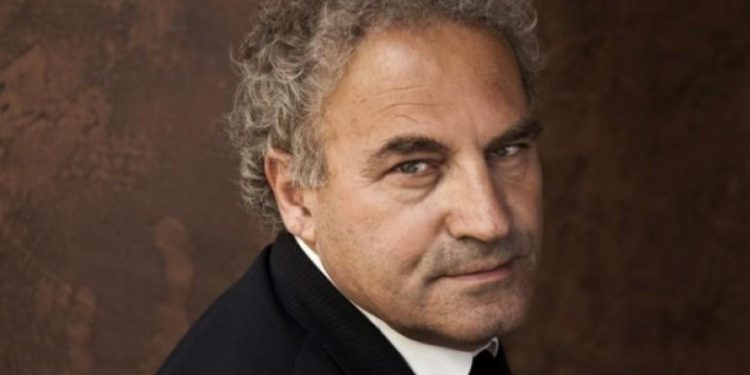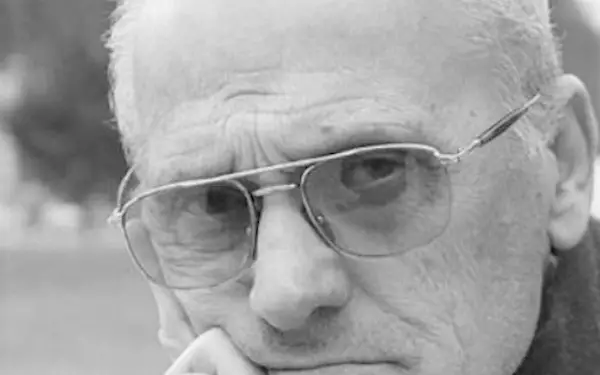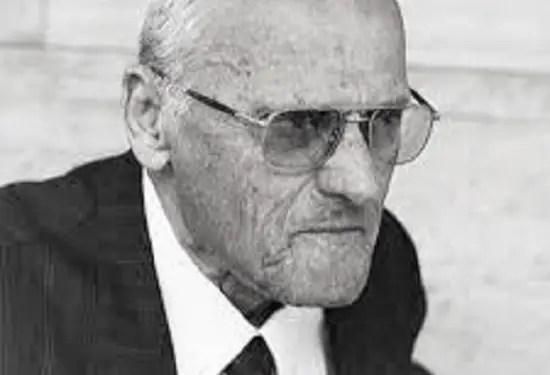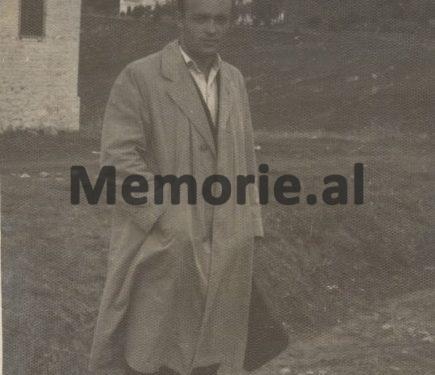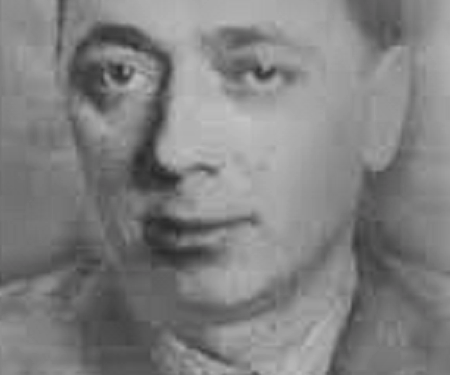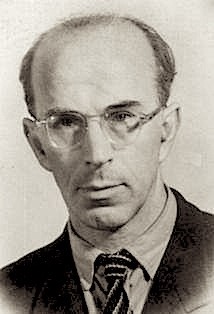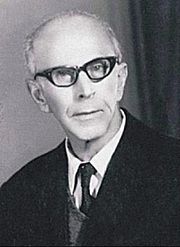From Visar Zhiti
The tenth part
Memory boards and bags…!
Continues from last issue
FROM THE EARLY PRISONERS, Kudret Kokoshi (1908-1991)
Poet. He was the first to be arrested in the first year of liberation. And liberation is not freedom, the prisons said. I would hear his name in prison, when they took me to prison late…! He was the one who wrote the poem about the Mother, many prisoners knew it by heart, but the surprise was that he knew the entire “Divine Comedy” by heart; he was like a Dante in prison, so they said, and he recited it in the original. And most importantly, his stay in prison had been manly. Where is now? He got out of prison. Is it alive? Even if he is dead, he is more alive than we are inside…
…was born in 1908, four years before the country’s independence, in the city where the Flag was proclaimed and raised, in Vlora. He completed his higher education in Law in Italy, received the degree of Doctor of Legal Sciences. He had a passion for literature and was awarded for literature. 26 years old, in 1934, he returned to serve his homeland. Here is a brief timeline of his life: –
– 1934, worked as a lawyer in Vlora.
– 1936, appointed assistant judge in Bilisht and Pogradec and three years later the court in Korça, Shkodër and Tirana.
– 1941, Chief Prosecutor in Prizren. Albania was united with its own Kosovo.
– November 28, 1942 is in the leadership of the anti-fascist demonstration in Prizren, where during the clashes, he was wounded in the forehead.
– Takes part in the war for liberation and in 1943 is one of the exponents of the National Front in Vlora.
– May 1944, arrested by the German Gestapo and deported to the Mat’hausen extermination camp.
– As soon as he returns to Albania, in June 1945, the communist victors arrest him and sentence him to death, as the leader of the National Front. The sentence was returned to 25 years in prison.
– After 19 years he returns to Vlora. He does hard work like those who were released from prison. He refuses to cooperate with the State Security and imprisons himself in his house. He was waiting for death. I don’t know, for myself or for the dictatorship…!
I did the last and only interview with Kudret Kokoshin. The Berlin Wall had fallen. I had just started working as a journalist in the first opposition newspaper “Rilindja Demokratike”. I went home to Vlora, as a former prisoner to fellow sufferers, but also a mythical ghost. He lay on the bed and his eyes shone frozen with a kind of shy excitement, because he was feeling freedom. His ringing voice was interrupted by irregular breathing. After he told me about his life, we moved on to translations, that Kudreti translated Albanian literature into Italian, the language in which he wrote and had once received literary prizes for his poems in Italy. The books were published without the name of the translator.
– Which authors have managed to give you satisfaction? – I teased him in a friendly way…!
– “Castle” of Kadare, “Dead River” by Jakov Xoxes and poems by Fatos Arapi.
– Which was more difficult, – I teased him again, – to translate socialist realism literature, or Burrell’s prison?
– There – there they were, – he said seriously. I smiled bitterly.
His only book of poems “Drithmë jete”, which came out in 1995, was prepared by me and my wife, Eda, who had been his student when he was secretly learning Italian.
A part of his poems, written by himself, were kept in a notebook, many had disappeared because he did not want them to find them.
Sometimes by the sea in Vlora, he recited a poem to his friends, which has gone with him.
I remember one dedicated to the women of Vienna, who during the war, left pieces of bread on the street, for the hungry prisoners to take when they were sent to work, among whom was Kudreti.
When we were in Vienna, we had his Albanian book with us and I didn’t know who to give it to. Our son, Atjoni, with a map in hand, told us that he would take us to a beautiful place and led us to the subway. When we went out, I expected to see some special statue or fountain, museum or well-known palace.
– What is it? – We asked the boy, looking around.
– It is the path of those women in that poem… – he told us.
Amazed, we left the book on the street, for whoever wanted to take it.
SONNETS TO THE MOTHER
Mother, I saw you after so many years away,
Broken, tearful and wasted.
I saw you, O Mother, leaning on a stick
Living marble of suffering and misery
You are very old, Mother, but you have some left
Former grace and in the eyes of sadness
Sweet, cuddly, oh, the sadness
I haven’t found any other creature!
You are too old, O Mother, but for me,
For my soul that worships You, You are
The most beautiful creature on earth!
Mother, I don’t want you, any other creature!
How I want to take your wrinkles.
To be old myself and you always young.
For whom was the poet moaning about his mother or his motherland? Or were they the same thing…
Kasem Trebeshina (1926 – 2017)
I have never seen so much boredom in a single person, so much dissatisfaction as in the writer Kasëm Trebeshina. We talked for a long time in his house one afternoon that quickly got dark, he criticized me too, that if I talked to his enemies, it was about socialist realism writers, he wouldn’t want me to talk about him either.
I told him smiling that no one, not even him, could prevent me from loving whomever I wanted, and likewise no one, not even the other one, could prevent me from loving Kasem Trebeshina.
They know him as the most stubborn, dissident to the point of nihilism, meanwhile the most productive, but not all published, the strangest and the most talked about, cordial in meetings, angry with everyone, even with the homeland, denying many things , even of his own dissidence, because, according to him, there are only universal and eternal themes, metaphors without metaphors. Tired of being Albanian, he insisted recently that he was Turkish. And there he died, in Turkey…!
And he had fought for Albania with a gun in his hand, he had become a partisan and after the war Kasëm Trebeshina worked in the strengthening of the institutions of the dictatorship, an officer of the Directorate of People’s Protection.
They take him to study theater in Leningrad and Moscow, where he rebels against socialist realism, they bring him to Albania as a madman, he writes a bold and forward-looking memorandum to the dictator Hoxha, which does honor to the Albanian intelligentsia, although they say that it is not found in they didn’t dare to give any archive to the dictator, his friends are arrested, his friends and other writers are witnesses in the trial.
They imprisoned him from time to time, prohibiting his work. There are already many published titles, in poetry, prose and drama, from the beautifully published novel, “Odin Mondvalsen”, to the 5-volume epic novel “Albanian Song”. Volume I was completed in 1951, but it was not allowed to be the first novel of the new literature. Other titles ‘Season of Seasons’, ‘Legend of the One Who Gone’, ‘The Road to Golgotha’, ‘Caesar Goes to War’, ‘Mekami’ – Turkish Melody, ‘A Day in the Endless Night’, (Dried Laurels ), etc., were also published in Kosovo, ‘Tregtari i skeletone’, with which he won the “Buzuku” award, etc.
A drama was published in Germany, where the translator called it “the greatest of the unknown”.
He left some 170 manuscripts, as well as the 8-volume novel Planetiada. And silence. The intentions. Not only had he not felt welcome as a writer, but on the contrary he was attacked. As there were well-wishers, more in Kosovo and abroad.
Meanwhile, as he wanted to say goodbye,
Warned:
…like every other person in Albania, I too am sentenced to life imprisonment….And no one can predict the end of this reign of absolute terror, because Albania is a lost country, because Albanians are a a lost people, without a real layer of leadership, doomed to wander eternally in a closed circle…!
And don’t forget: We haven’t left the dictatorships behind! The most terrible dictatorships, also loaded with science, will be ahead of you. Think hard… For your sake and those to come!…
Farewell…!
Peter Arbnori (1935-2006)
I would also work with the other ex-prisoner, nicknamed “Mandela of the Balkans”, who after 29 years in prison, would become the speaker of the Albanian Parliament and take over the dictator Enver Hoxha’s office, would use the same phones. ..
A little further would be my office…!
Pjetër Arbnori, from Shkodran, from Shiroka, but born in Durrës, the son of a Gendarmerie officer, who took part in the armed resistance against the fascist occupation on April 7, 1939, and who was killed in 1942 by partisan squads.
He studied at the Saverian College and then at the gymnasium of Shkodra, but with the name Pjetër Filipi…! With friends, they started distributing tracts, collecting them after jumping from the plane from the Committee outside, “Free Albania”.
He becomes a music teacher, gets fired, is recruited as a soldier, works on the Xhafzotaj Farm, in Shijak, etc. He manages to get permission to continue the correspondence university in Tirana; he is appointed a literature teacher in Golem, but now under the name Pjetër Toma. In 1962, he was arrested because he was part of a group that wanted to form a social-democratic party and sentenced to death. His sentence is returned to 25 years in prison…!
In Burrel, he started writing novels and novels, metaphors against the dictatorship. “When the Vikings come”, “Middle Ages”, “Beauty with the shadow”, “Black and white”, “Unknown”, “Death of Goebbels”. The novel “The House Left Half”, is the work that was caught in prison and after they did the act-expertise, writers of socialist realism in Tirana, sentenced him to another 10 years in prison, when he had written them, without interruption 18 years. Then we will have the novels “Whirlwind”, “Brighton, a distant lightning”, he translates “The History of England” in prison, etc.
He was released in 1989 at the age of 54, while he was 26 when he was arrested.
He returns to Shkodër and participates in the first demonstrations against the communist dictatorship, in the fall of Stalin’s bust, in the founding of the Democratic Party. He was elected deputy and then in 1992 and Speaker of the Assembly.
At this time, he calls me to work with him. I find there one of those whose name was in the drafting of the act-expertise for my poems, when I was sentenced. Poetry was now bringing peace. Thanks to us…!
Peter had gentleness and steadfast determination. It was coming slowly but surely. Meanwhile, prison books were being published one after another. The letters from the prison “I love you mother” also came out. Like the last sigh, but which is the first of every human being. And a historical study “From life in communist prisons”, 1992.
And the year 1997 comes, of the mass rebellion, directed by the socialists who take power, not only with votes, but also with weapons. Pjeter Arbnori goes on a hunger strike, alone, as a protest against the censorship against free speech and the loss of the independence of the press. The issue is internationalized and the “Arbnori Amendment” wins.
The book with his interviews is published: 1990-2000, “The Struggle to Remain Human”. Meanwhile, there are many honors: “Teacher of the People”, “Torch of Democracy”, “Mother Teresa Order”, “Gjergj Kastrioti Skënderbeu”, etc.
While the Democratic Party had returned to power, the wise Peter, with untold disappointments, had to go to Naples for a surgical intervention and suddenly died in the hospital, after a cerebral hemorrhage.
He is buried in Shkodër in the Catholic Cemetery of Rrmaj.
Honored with the title “Honour of the Nation” posthumously. In front of the Parliament, where he left his mark, is his statue, which he waited until recently to be placed by his opponents, the socialists.
Pjeter Arbnori also left a diary, which he kept secretly, written in his own alphabet, specially invented for the diary, which no one could read, just like the prisons themselves now, the ruins of Spač, Qafë-Bar, Ballshit, Vloçishti Swamp, etc., with that cold, absurd horror, which are neither prisons nor museums…!
I had told Peter, the diary, this will remain, give it importance. Later, he told me, when I quit my job and I will have my time that even I don’t know how to read anymore…!
It seems the time we want never comes, but will our puzzles ever be readable?
The two prisons, here and there on the border…, Selman Riza (1909 – 1988)
…scientist in linguistics, prominent albanologist, patriot and activist, who unites Kosovo with his motherland, with Albania.
At the age of 13, he ran away from his hometown Gjakova and set off on foot to Tirana, he really wanted to study and was the best student at the comprehensive school “Naim Frashëri”. He also graduates from Korça High School with flying colours. And the Ministry of Education starts to study in France. In Toulouse, for 3 years (1932 – 1935) he graduated from two faculties, French Language and Literature and Law. After studying in German-Stic Austria, he returned to his homeland to work.
He openly opposes the fascist occupation and is exiled there, on the Island of Wind, in Ventotene, a friend of Zai Fundo, but he is not a communist. Friend with Safet Butka, but not with the “National Front”.
He returns to his homeland in Durrës, and then to Prizren, where he works as a lawyer, and is put in charge of the movement for the union of Kosovo with Albania, as a special case.
After the end of World War II, he returned to Tirana. The victors arrested him in 1945, with the accusation: “Kosovar anti-Yugoslav”. He is imprisoned and spends three years in prison without a court decision, and then he is handed over to Yugoslavia, where he spends another three years. After the exile in Sarajevo, he returns to Pristina, where he devotes himself to academic work. Then the Yugoslavs drove him out and closed the Albanological Institute run by Riza.
In 1956 in Tirana. It is viewed with suspicion, it is persecuted. The greatest intellectuals are seen as having the possibility of being of service to the countries where they studied. Çabeji, as an agent of the Austrians, the Germans; and Riza, of the Yugoslavs…!
The theoretical thought establishment of the time seeks to impose itself. Intellectuals with their authority can bring another version, so they are kept like that.
Enver Hoxha wrote a letter in 1944, where he asked the Yugoslav Party for Kosovo to: “keep him, the pseudo-liberal, aside”.
Professor Riza works at the Institute of Albanology, teaches morphology and studies old authors. And he asks that the Albanian scientists, his colleagues, concentrate on the great drafting of the Dictionary of the Albanian Language, which requires more dedication than the dictionaries they are dealing with, Russian-Albanian. After he throws out the idea of the impossibility of applying Marxism-Leninism in linguistics, the open attacks resume, “speak-lightning” – plaques against him, stuck on the wall, where they reminded him of the prisons.
Without waiting, he is given the “Republic Award” for his achievements in science, so he will suffer anything and they move him to Berat, they give him a job as a speaker in a museum. He was returned to Tirana in 1970, where he continued his work with his mother tongue, the scientific approach between two dialects for a natural literary language.
But the silence around him, the secret persecutions would continue. In the beginning, the language of tradition was persecuted like this, the union of Albanians.
Lands had been torn apart; the language would also be torn apart.
It dies. He had asked to rest in his homeland… where the language had tasted like the air, like the land, like the springs…! Memorie.al
The next issue follows




